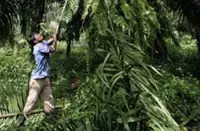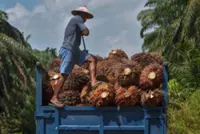KUCHING: Sarawak Plantation Bhd is expected to fully rehabilitate the entire 6,000ha of oil palms on its unproductive estates this year, says its executive director Datuk Wong Kuo Hea.
is expected to fully rehabilitate the entire 6,000ha of oil palms on its unproductive estates this year, says its executive director Datuk Wong Kuo Hea.
Since the 6,000ha had been identified as being in need of improvement and enhancement, he noted about 93% had been rehabilitated and normalised, including 300ha in 2023.
“The group started to identify areas in need of improvement and enhancement in 2018.
“The common issues faced in such enhancement areas include stunted palm growth, inaccessibility due to high weeds, flooding and other upkeep issues.
“These areas are mostly young mature fields in critical need of rehabilitation,” Wong said in the company’s latest 2023 annual report.
Sarawak Plantation has 13 oil palm estates with a total land size of 42,182ha mostly in the northern and central Sarawak region, of which about 35,400ha is plantable.
The group also has a 405ha joint-venture oil palm estate with a Sarawak state agency.
Last year, about 1,100ha of oil palms were declared mature.
Of the planted area, about 70% is in the prime-mature age profile between seven and 20 years.
Meanwhile, Sarawak Plantation has made good progress in taking back certain mature oil palm areas in Mukah, central Sarawak, which was encumbered by local villagers because of disputes on native customary rights (NCR).
“Since 2018, the group’s dedicated team engaged with the locals in the affected areas.
“Through their efforts, the group has successfully recovered around 4,200ha to date, of which approximately 500ha was recovered during financial year 2023 (FY23).
“As at Dec 31,2023, the mature areas remaining encumbered were around 2,200ha.
“Despite numerous challenges faced in recovering these encumbered areas,the group is committed to striving its best to recover all or at least part of the encumbered areas,” Wong noted.
Back In 2018, Sarawak Plantation became an associate company of Ta Ann Holdings Bhd , which acquired a 30.29% stake in the former for RM169.9mil.
, which acquired a 30.29% stake in the former for RM169.9mil.
Wong who is also Ta Ann group managing director and chief executive, said the group is accelerating the replanting of the recovered encumbered areas as well areas with severe ganorderma infestion and low palm stands
In FY23, the group carried out replanting of about 1,100ha and incurred about RM25.1mil in replanting expenditures as well as maintenance of its existing immature areas.
To ensure sustainable oil palm cultivation standards, Sarawak Plantation ceased new plantings on peat land several years ago.
“Replanting is a significant milestone for the group, with the ultimate goal of maintaining sustainable growth.
“Low yielding old mature fields as well as severe ganoderma infested areas are replanted in stages.
“These areas were replanted with high yielding seeds, thus leading to increased production over time,” Wong explained.
Sarawak Plantation produces high yielding oil palm seeds under the brand name “Surea DxP”, he said, adding that these genetically superior seeds are proven to have high fresh fruit bunch (FFB) yields and oil, as well as having high oil quality.
“High-quality seeds will ensure consistent yield over time and help to reduce the risk of disease outbreaks in the estates,” he pointed out.
The group operates three oil palm nurseries – two in northern Sarawak and the third in central Sarawak – and nearly doubled its production to about 1.8 million seeds in 2023 from 0.9 million seeds in 2022.
These seeds were used mainly for the group’s replanting programme during over the two years.
Wong also said the group plans to scale up its seed production capacity to fulfill its own replanting requirements as well as to sell to oil palm companies in Sarawak and to expand its customers’ base to boost revenue growth.
On estate mechanisation, Wong said the group operates 10 harvesting machines at its estates in northern Sarawak, and that mechanisation had shown positive results in increasing productivity.
The group will expand the utilisation of harvesting machines, which were commissioned last year and extend their operational coverage.
“Embracing mechanisation for harvesting and other field operations is a sustainable approach to reducing labour dependency,
“Mechanisation is carried out wherever feasible to increase the productivity of workers, thereby enhancing operation efficiency.
“The group will also intensify the use of harvesting machines in suitable harvesting areas and continue monitoring their performance for further enhancement,” added Wong.





